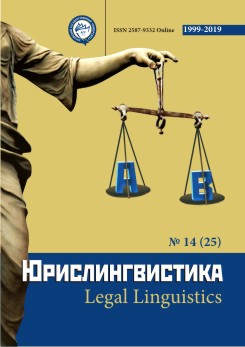Interdepartmental Round-Table Discussion with International Participation “Challenges of Investigative, Expert Work and Ways to Address Them”
Abstract
Barnaul University of the Russian Interior Ministry hosted interdepartmental round-table discussion with international participation "Challenges of Investigative, Expert Work and Ways to Address them" on October 24, 2019. The subject of discussions was commissioning, production and subsequent administration of expert evidence to the cases containing signs of offense against human honor and dignity. The round table discussion concerned preliminary work of the investigator, the interrogator, and the district police officer with the materials containing elements of slander and insults, their pre-expert assessment before commissioning linguistic analysis. The participants of the round table discussion considered measures to improve the efficiency of the use of special linguistic knowledge in the process of investigation and clearing of crimes, as well as the possibility of reducing the time of production of forensic analysis.
Downloads
Metrics
Copyright (c) 2019 Андрей Коряковцев

This work is licensed under a Creative Commons Attribution 4.0 International License.
The authors, which are published in this journal, agree to the following conditions:
1. Authors retain the copyright to the work and transfer to the journal the right of the first publication along with the work, at the same time licensing it under the terms of the Creative Commons Attribution License, which allows others to distribute this work with the obligatory indication of the authorship of this work and a link to the original publication in this journal .
2. The authors retain the right to enter into separate, additional contractual agreements for the non-exclusive distribution of the version of the work published by this journal (for example, to place it in the university depository or to publish it in a book), with reference to the original publication in this journal.
3. Authors are allowed to post their work on the Internet (for example, in a university repository or on their personal website) before and during the review process of this journal, as this may lead to a productive discussion, as well as more links to this published work (See The Effect of Open Access).











